Algarve-Tourist.com
The best independent guide to the Algarve
Algarve-Tourist.com
The best independent guide to the Algarve
When to Visit Albufeira: weather guide and best month to visit
Albufeira is the largest and liveliest resort town in southern Portugal, sitting at the heart of the beautiful central Algarve region.
The town is blessed with a glorious Mediterranean climate, which means it enjoys dry and hot summers, and winters that are pleasant and mild. The region boasts over 300 sunny days annually, with July and August providing nearly 12 hours of sunshine each day.
The peak season is July and August, which aligns with summer holidays. During this period, expect packed beaches, hotels at near capacity, and the liveliest nightlife. If you want a buzzing, party-focused holiday, then these are the months to visit.
For most visitors, the best months to visit Albufeira are either side of the peak season, in June and September. The weather is still fantastic, everything is fully open and there is a buzz about the town, but without the hectic atmosphere of the peak months.
The weather is suitable for heading to the beach or lounging by a pool from mid-April until the end of October. Spring and autumn are outstanding times for an activity-based holiday, or to explore the surrounding region via day trips.
In winter (November to March), the temperature cools and there is always the chance of rain. Albufeira will feel very quiet compared to the summer, but the town has a steady flow of visitors year-round. Even in the low season, the majority of bars, restaurants and shops remain open, making it suitable for a trip.
This article will help you determine the best months to visit, detail Albufeira's weather and help you make the most of your trip to this exciting holiday destination.
Related articles: Albufeira introduction - Sights and activities
The weather of Albufeira
Albufeira enjoys a Mediterranean climate with distinct seasonal variations. Summers (June-September) are hot and dry, with July and August reaching highs of 33°C (91°F) and minimal rainfall. These months offer reliably sunny days, perfect for beach activities.
Spring (March-May) brings mild temperatures ranging from 18°C (64°F) to 25°C (77°F), with increasingly stable weather as the season progresses. Early spring may experience occasional rainfall, but by May, beach days become common.
Autumn (October-November) remains pleasantly warm, with temperatures gradually declining from 25°C (77°F) in early October to around 18°C (64°F) by late November. This season experiences the beginning of rainfall increases, though many days remain clear and sunny.
Winter (December-February) is mild compared to northern Europe, with daytime temperatures typically between 15-17°C (59-63°F) and cooler nights at 8-10°C (46-50°F). December and January see the most rain, however, Albufeira still enjoys 5-6 hours of sunshine daily.
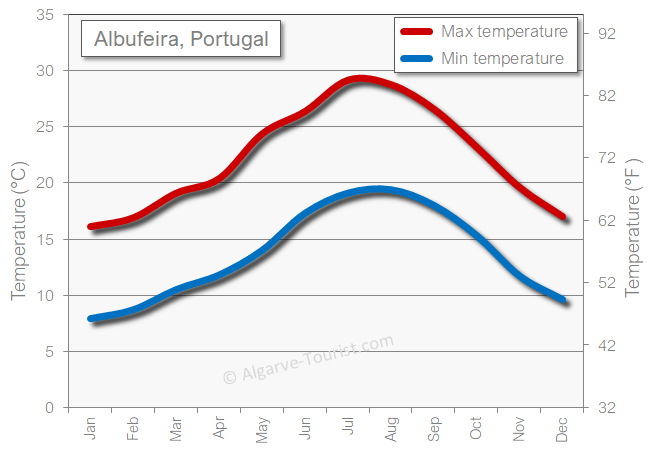
The daytime maximum temperature (measured in the shade) and night-time minimum
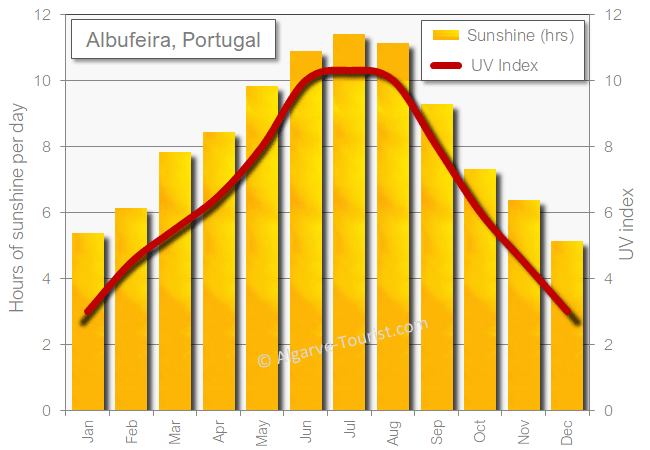
The average hours of sunshine per day and UV intensity
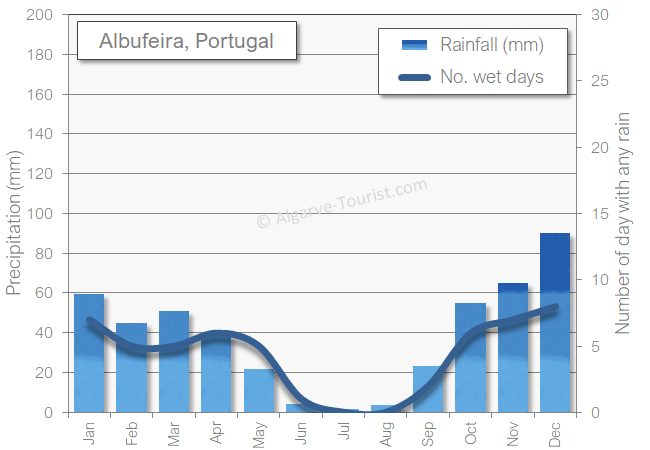
The monthly rainfall and number of wet days
How many beach days per month?
Before planning your beach holiday in Albufeira, it's helpful to understand how beach-friendly the climate is throughout the year. We define a "beach day" as one with at least 3 consecutive hours of full sunshine and temperatures exceeding 23°C (73°F) during this period—conditions that most visitors would consider enjoyable for a day on the beach.
Summer provides the most reliable beach weather, with nearly every day in July and August suitable for visiting the beach. In contrast, the winter months of December through February rarely offer conditions that meet our beach day criteria, with temperatures typically remaining below the 23°C threshold even on sunny days.
The following chart illustrates the average number of beach days you can expect for each month in Albufeira:
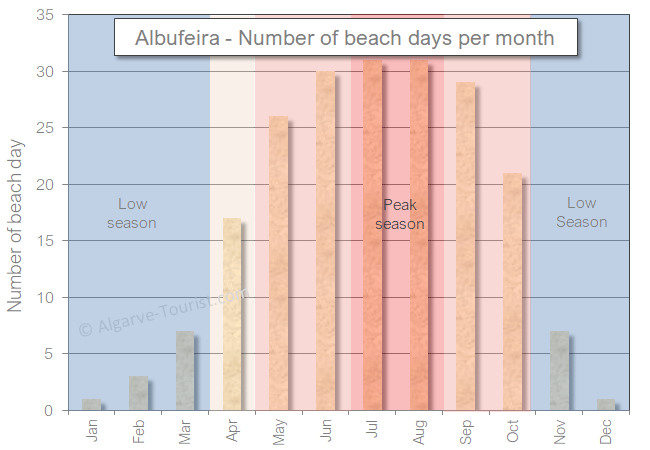
Albufeira for 2025
Albufeira is one of the Algarve's finest resort towns, and its combination of beautiful beaches, wealth of activities and vibrant atmosphere means it is always a favourite with tourists. During the summer months, the town will sell out, and it is advisable to book accommodation and flights as soon as possible to secure the lowest prices.
Many hotels and rental properties offer free cancellation options, allowing you to book with confidence knowing your plans can change if needed. The map below shows available accommodation options in Albufeira Simply adjust the dates to your planned holiday period to see current prices and availability.
Booking.comSea Temperatures in Albufeira
If you're new to Albufeira, you might be surprised by the relatively cool sea temperatures. Unlike the warm, gentle waters of the Mediterranean, Albufeira's beaches face the Atlantic Ocean, which significantly influences water temperatures throughout the year.
These naturally cool sea waters are further chilled by the North Atlantic Current, which brings cooler waters southward along Portugal's coastline. The contrast between hot air temperatures and the chilly ocean can be quite striking, especially at the height of summer.
The winter months (December through March) see the coldest waters, typically ranging between 14-16°C (57-61°F). Spring brings gradual warming, with April averaging 17°C (63°F) and May reaching about 18°C (64°F). By summer, the ocean becomes more inviting with the warmest temperatures in August and September, peaking at 22°C (72°F).
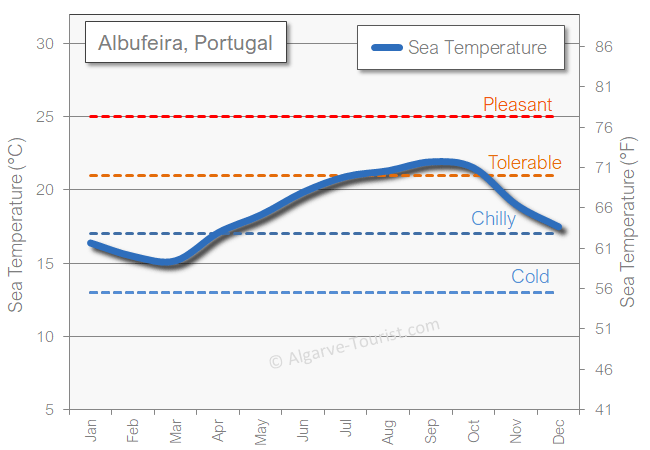
What to Expect from Each Season
The tourist seasons in Albufeira are divided into four distinct periods, each offering a different experience for visitors.
Peak Season (July-August) – This is Albufeira at its busiest, with packed beaches, hotels at full capacity, and a vibrant atmosphere throughout the town. Advance bookings are essential for accommodation and popular restaurants, with prices reaching their annual peak. The weather is consistently hot and sunny, perfect for dedicated beach holidays.
The Strip, at the centre of the New Town, becomes hectic every night with crowded bars and packed nightclubs staying open until sunrise. This lively environment may not be suitable for families, who tend to gravitate eastwards toward the more relaxed Santa Eulália side of town.
High Season (June and September) – These months offer the perfect balance of great weather and slightly reduced crowds. The temperatures remain warm enough for all beach activities, the sea has begun to warm nicely, and most attractions operate at full capacity. This period is ideal for visitors without children who can travel outside school holidays, offering a more relaxed experience while still enjoying the lively summer atmosphere. There will still be lively nightlife in the Strip.
Shoulder Season (April, May and October) – This is arguably the best time to visit for travellers seeking value and comfort. In the old town the average age of visitors increases but there is still a party atmosphere every weekend at the Strip, with a large number of groups heading to Albufeira.
The pleasant climate of the shoulder season makes this the ideal time for an activity-focused holiday or a sightseeing trip. Beach days are still possible, particularly in May and early October, though you might encounter occasional rainfall. The reduced tourist numbers mean significantly lower accommodation rates and a calmer holiday experience. All restaurants and shops remain open during the Shoulder Season, though some beach bars may operate reduced hours.
Low Season (November-March) – Albufeira becomes very quiet during these months, offering a completely different experience. Many tourist-oriented businesses close or reduce their hours, but enough amenities remain open to serve visitors.
The mild winter climate still allows for outdoor activities on fine days, and you'll find considerably lower prices for accommodation. This period appeals to long-stay visitors seeking winter sun and those looking to experience local culture without the tourist hustle.
As Albufeira is the largest tourism-focused town in the Algarve, it is the best place to head to during the winter months.
When best for young families (Easter to July)
If you are planning a family vacation, it is wise to jet out to Albufeira from May to July when the temperatures start to warm and any rain clears.
The waterparks, high ropes activity centre and Zoo Marine all start their peak season hours from May onwards. Family-friendly restaurants and accommodation options are more varied and the beaches are safe and attended.
Older people (September to October)
For tourists wanting a slower pace and a more authentic Algarve experience, early autumn is recommended.
The families and partygoers have gone home, the weather is still warm and the days are long enough to relax. Albufeira is a good option for autumn sun and sunbathing on the main beaches is still comfortable without the sweltering heat.
The local restaurants and the old town are still very much open and alive but are much quieter for roaming around rather than being packed in with crowds of other tourists.
Albufeira Alternatives: Portugal's other beach destinations
If you can't find accommodation in Albufeira during peak season, the Algarve offers many excellent alternatives. Lagos, with its stunning cliffs and historic center, provides a perfect blend of beaches and culture. Carvoeiro offers a more relaxed atmosphere with beautiful cove beaches, while Tavira in the eastern Algarve features authentic Portuguese charm with its traditional architecture and island beaches. Vilamoura attracts visitors with its upscale marina and golf courses, and Praia da Rocha boasts a wide golden beach with dramatic rock formations.
Beyond the Algarve, Portugal has a host of coastal destinations that are perfect for sun seekers looking to avoid summer crowds. Further north, the capital city, Lisbon, and second city, Porto, are both surrounded by many outstanding beaches that have all the family-friendly amenities and lively summer time atmosphere.
Cascais, just west of Lisbon, combines elegant beaches with a sophisticated resort atmosphere. Nazaré, famous for its giant waves and fishing traditions, offers a unique coastal experience. Ericeira, a world-class surfing reserve, presents a relaxed vibe with beautiful beaches and excellent seafood.
Our most popular articles for Albufeira and the Algarve
If you've found our content valuable, we'd welcome your support.
The digital publishing landscape has evolved significantly. As a small independent publisher, we face growing challenges. Search engines increasingly favour paid content over organic results, while AI-generated content often reproduces original work without attribution.
To support our work, please consider bookmarking this page (press Ctrl + D) for quick access. If you find an article helpful, we'd be grateful if you'd share it with friends on social media.
For specific questions, please see our Reddit community at r/LisbonPortugalTravel.
Should you notice any outdated or incorrect information, please contact us at [email protected]
Thank you for helping us continue to provide valuable content in an increasingly challenging digital environment
























